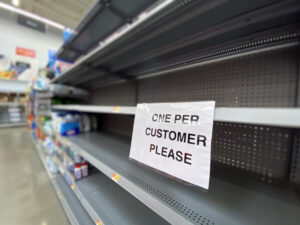Panic buying, the media and empty shelves – exploring the psychology of supply chain disruption

Supply chain shortages have been headline news in the UK in recent months, with everything from Covid-19 to Brexit blamed for empty shelves and long queues at petrol stations. But could consumer behaviour be the critical difference between manageable supply chain disruption and major shortage problems?
The vicious cycle of stockpiling and shortages
Panic buying during a crisis such as the coronavirus pandemic often starts with, or is fuelled by, media coverage. Sensational headlines such ‘Consumers told to rush on Christmas shopping due to expected shortages’ and ‘Petrol crisis: Fuel shortages ‘getting worse’ in London and Southeast’ only serve to make consumers anxious about supply levels.
Even reports advising against panic buying tend to have the opposite effect, planting the seeds of worry that there may be shortages for consumers to be concerned about.
As for why panic buying happens in the first place, some psychologists see it as a fear-driven behaviour, where we act selfishly because we sense a threat to our survival. There’s also FOMO (fear of missing out), which can be a powerful psychological motivator to start stockpiling. Other potential factors include the chance to regain a sense of control over a situation as frightening as the pandemic, as well as acting in response to other people’s behaviour.
Inevitably, panic buying and stockpiling leads to increased demand, low stock and ultimately, disruption to the supply chain. A classic example is the now-famous toilet roll panic of 2020, where irrational consumer behaviour ended up actually causing the empty shelves everyone was concerned about in the first place.
A spokesperson for transport marketplace Shiply explained how this self-perpetuating cycle tends to work:
“Our main goal as a business is to help connect customers with delivery partners in the easiest and most cost-effective way possible. We maintain and analyse a lot of user data to help us perform our role in the most efficient way. The data we hold tells us a lot of things about consumer habits and how businesses are able to respond to them.
“One thing we always see is that when there is talk of a specific shortage, listings will appear on our platform that wouldn’t usually, for example, pallets of loo roll being shipped at the start of lockdown.
“Eventually, it becomes a self-fulfilling prophecy; the media reports that there are shortages, people respond to that by stockpiling what they think is a reasonable amount to mitigate the risks they’re being warned about, then supply drops, demand increases and before we know it the risks are realised.”
Have consumers changed their ways after Covid-19?
Now that the dust has settled after an unusual and difficult year, research suggests that over half (57%) of consumers now regret their stockpiling behaviour during lockdown.
Furthermore, around 1 in 5 shame-faced shoppers still had products leftover after restrictions eased, and 8% still have some products on their shelves to this day.
Over half (52%) of consumers are firm that they will definitely not panic buy this Christmas, while 64% are resigned to missing out on certain items due to shortages and delays. For 31% of people, warnings about turkey, toy and other festive shortages will not change their ordinary Christmas shopping plans.
There’s optimism that, thanks to lessons learned in lockdown, a new generation of more rational and ethical consumers has been created. Without extra panic-buying crises causing further disruption, this could give supply chains some breathing room to recover from the twin shocks of Brexit and the pandemic.
However, Sam Tyagi, CEO of the AI-driven ‘logistics as a service’ platform KlearNow that commissioned the research, believes that this changing consumer behaviour also lays down a major challenge for retailers. He said:
“It seems that 18-months of uncertainty and upheaval in retail have impacted consumers’ expectations. In the past it seems likely that any hint of disruption to product supply would have created early buying and some hoarding of products, it’s reassuring to see that this just isn’t the case now.”
“Whilst I see many positives in this revelation, I think it may be a wake-up call to retailers who are banking on strong revenues this Christmas. The results suggest that consumers are pragmatic and may simply accept they can’t have something rather than go to greater lengths to seek it out or find an alternative. So, it’s imperative that retailers, suppliers and freight forwarders work together with Government to find creative solutions to the multiple supply chain issues which, according to our customers, are worsening not improving.”
“It’s heartening to hear that a significant percentage of people now understand that stockpiling is a largely pointless exercise. Whilst we may find shelves missing our favourite items or brands, we’re unlikely to see completely bare shelves in the run up to Christmas, but retailers may struggle to offer the same range of choice this year.”
By Sean Pearson




